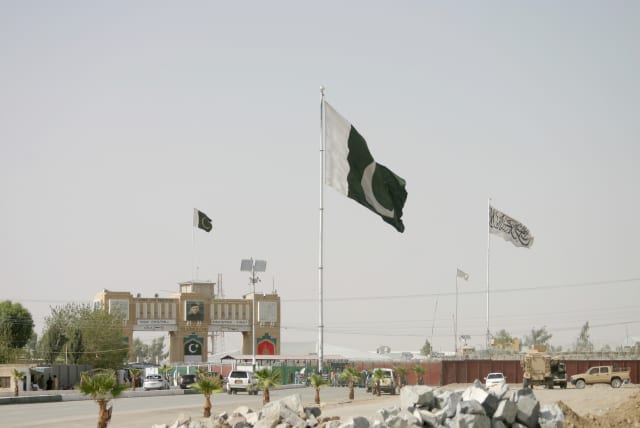Pakistan-Afghanistan trade talks address '50% decrease in transit trade'

The trade ties between the two neighboring countries have significantly worsened recently due to frequent border skirmishes.
Pakistan and Afghanistan commenced two-day trade talks in Kabul on Monday, against the backdrop of strained relations stemming from security concerns.
Pakistan's delegation, spearheaded by Federal Secretary for Commerce Muhammad Khurram Agha, is engaged in high-level discussions with the Afghan delegation, led by Minister for Commerce Nooruddin Azizi.
The Pakistani delegation comprises Maria Qazi, the joint secretary of the Ministry of Commerce, Dr. Wajid Ali Khan, the additional secretary of Commerce, and Khushal Khan, the director general of Transit Trade, and an additional secretary representing the Ministry of Interior.
The Pakistani delegation also features a senior official from the Interior Ministry, which indicates that in addition to trade matters, discussions will also encompass strategies to combat smuggling issues.
Mumtaz Zahra Baloch, spokesperson for the Pakistani Foreign Office, stated that the delegation's two-day visit, aimed at discussing trade issues between Pakistan and Afghanistan, emphasized “Pakistan's dedication to fostering trade and mutual relations with Afghanistan.”
She added that “during the two-day visit, the Pakistani delegation will deliberate on collaborative measures to address challenges encountered by transporters and traders at border crossing points.”
Addressing the challenges, Abdul Salam Jawad, spokesperson for the Afghan Commerce Ministry, stated, “We will raise concerns regarding the ban on several transit items. Pakistan's restriction on the import of specific items under the transit agreement has resulted in a 50 percent decrease in transit trade, with trade diverting to Iran.”
Jawad also accused Pakistan of complicating matters in the trade sector.
The trade ties between the two neighboring countries have significantly worsened recently due to frequent border skirmishes and the closure of vital crossing points along their shared border.
These blockades have strained diplomatic relations and have also inflicted substantial economic losses on both sides, especially impacting communities and industries reliant on trade.
This development follows Pakistan's recent airstrikes on suspected militant hideouts in Afghanistan. Additionally, the expulsion of Afghan refugees has further exacerbated the already tense relations between the neighboring countries.
Talks signal positive shifts in dynamics
Consequently, due to the increasingly bleak situation, which seems to have involved India, regional security and stability were threatened. However, the talks have signaled a positive shift in dynamics.
As India lacks a direct land connection with Afghanistan, trade between India and Afghanistan relies on transit corridors facilitated by Pakistan under the Transit Trade Agreement. In a recent interview with Voice of America, Pakistan's Foreign Minister, Khawaja Muhammad Asif, emphasized that Pakistan has no desire for armed conflict with Afghanistan. However, he also warned that if Afghanistan persists in treating Pakistan as an enemy, Pakistan reserves the right to close the Indian trade corridor between the two countries.
India's influence may also have played a role in Pakistan's decision to hold talks with Afghanistan. The Pakistani authorities have been alarmed by reports that, with the backing of a substantial US$35 million Indian investment, Kabul recently inaugurated a versatile commercial complex in Iran's southern Chabahar Port, which is a strategic trade route to Kabul.
While the announcement of this investment, which forges closer ties between Kabul and Iran, has stirred economic currents across South Asia, it has unsettled policymakers in Pakistan, especially amid a months-long strained relationship between Pakistan and Afghanistan over trade and border issues.
Last year, Pakistan implemented a ban on certain items within the Afghan transit trade and imposed stringent conditions on others. This action was prompted by concerns over the loss of US dollars and Pakistan's challenging economic situation.
As a result, the import duty on Afghan transit trade was raised by 10% in October 2023. Additionally, there was a decision to enhance the monitoring of goods involved in Afghan transit trade, alongside imposing a ban on the import of specific goods through this route.
The then-caretaker government of Pakistan justified these measures as necessary steps to combat illegal imports facilitated by the Afghan transit trade.
Smuggling poses a significant concern for Pakistan as it undermines the integrity of Pakistani products. Therefore, the country expects cooperation from Afghanistan in curbing smuggling activities.
Pakistani officials say that the imposition of additional duties on Afghan transit trade has acted as a deterrent to those engaged in illegal trade activities. Pakistan has also committed itself to closely monitoring the goods involved in the Afghan transit trade. However, these measures have raised concerns among Afghan authorities.
Commenting on Pakistan's efforts to improve cross-border relations, Ziaul Haq Sarhadi, a Peshawar-based leading businessman and a coordinator of the Pak-Afghan Joint Chamber of Commerce and Industry, told The Media Line that “last year, the [Pakistani] Ministry of Commerce introduced Statutory Regulatory Orders, enforcing a ban on 14 particular items involved in the Afghan Transit Trade.”
“The regulatory measure, along with the enforcement of a 100 percent bank guarantee, severely affected bilateral trade relations. It has had considerable effects on the economies of both nations, causing considerable strain on economic ties,” he added.
According to Sarhadi, “cargo goods had been consistently covered under insurance guarantees, ensuring their safe transit to Afghanistan for the past 13 years.” Moreover, during this time, “more than one million trucks successfully reached their destinations without a single instance of damage.”
Urging for the reversal of the requirement for a 100 percent bank guarantee and advocating for reinstating the previous insurance guarantee system, Sarhadi told The Media Line that Pakistan and Afghanistan had previously agreed to increase bilateral trade to $5 billion. The current trade volume is less than $1 billion.
He claimed that as a consequence of these measures, “thousands of individuals have lost their jobs, and approximately 50,000 families who were involved in this trade have been affected.”
Meanwhile, Haji Abdullah Jan Kandahari, a member of the Kandahar Chamber of Commerce, told The Media Line that “the persistent security challenges between Afghanistan and Pakistan are significantly impeding the smooth flow of trade activities.”
According to Kandahari, the inconsistency in Pakistan's statements adds further complexity to an already delicate situation.
Expressing skepticism about the prospect of advancing bilateral trade under such circumstances, he relayed “the urgent necessity for both countries to engage in earnest efforts aimed at rebuilding mutual trust and fostering stronger trade relations.”
In Pakistan, stringent measures have led to significant financial hardships for local traders and their business associates. For example, Syed Abdul Baqi, a longstanding businessman from Jalalabad whose family has sold fruits and vegetables for three generations, told The Media Line that “at the border, our containers are held up, causing the fruits and vegetables to spoil while awaiting clearance.”
“The closure of vital crossing points and trade restrictions have already caused substantial economic losses for both countries, affecting communities and industries reliant on cross-border trade," Najeeb Ullah Mohmand, an Islamabad-based defense, security, researcher, and peace activist, told The Media Line. “This economic impact could incentivize both sides to find mutually beneficial solutions.”
“Given the current circumstances, diplomatic and trade ties between Pakistan and Afghanistan can improve, but it will require concerted efforts from both sides,” Mohmand added.
“Engaging in trade discussions in Kabul demonstrates a readiness to foster dialogue, marking a positive stride forward. Nevertheless, persistent security concerns such as the presence of TTP, ISK-P, and recurrent border skirmishes pose substantial challenges that must be addressed,” Mohmand continued.
Strengthening diplomatic and trade ties between Pakistan and Afghanistan is not only crucial for their bilateral relationship but also for regional stability.
“Pakistan and Afghanistan share a profound geographical proximity, fostering a high degree of interdependence between them,” Rehmat Mehsud, a Rawalpindi-based analyst, told The Media Line.
“Various domains are involved in this relationship, including security, business, trade, education, and healthcare. Pakistan offers affordable healthcare facilities to Afghan citizens and has a large number of Afghan students pursuing their education there. Pakistan also enjoys access to inexpensive Afghan food items,” Mehsud added.
“Given these intertwined realities, one would expect the relationship between the two countries to be excellent and mutually beneficial. However, this potential is significantly hindered by persistent security challenges that cast a shadow over all aspects of cooperation, undermining the full realization of the benefits that could be derived from the close ties between Pakistan and Afghanistan,” he said.
“Kabul must acknowledge and prioritize addressing these security concerns. By doing so, both countries can pave the way for enhanced cooperation and mutual prosperity across various sectors, fostering an environment conducive to stronger bilateral relations,” Mehsud concluded.
Jerusalem Post Store
`; document.getElementById("linkPremium").innerHTML = cont; var divWithLink = document.getElementById("premium-link"); if (divWithLink !== null && divWithLink !== 'undefined') { divWithLink.style.border = "solid 1px #cb0f3e"; divWithLink.style.textAlign = "center"; divWithLink.style.marginBottom = "15px"; divWithLink.style.marginTop = "15px"; divWithLink.style.width = "100%"; divWithLink.style.backgroundColor = "#122952"; divWithLink.style.color = "#ffffff"; divWithLink.style.lineHeight = "1.5"; } } (function (v, i) { });

